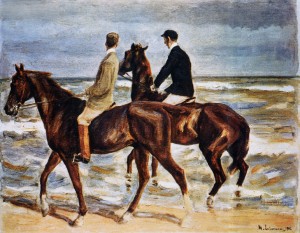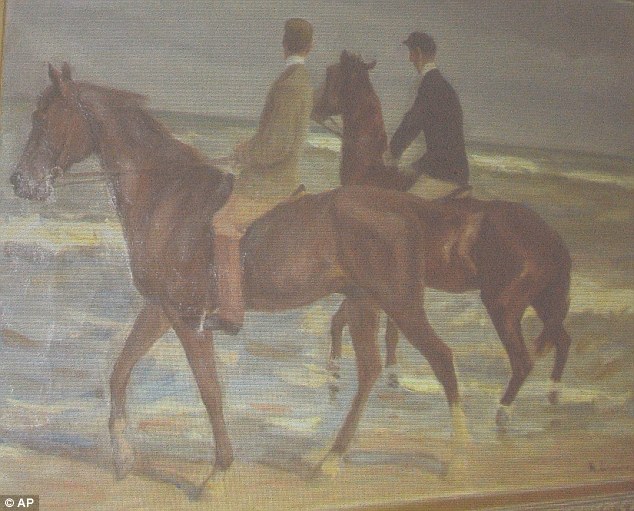Two weeks ago, the Federal Republic of Germany and Bavaria moved to dismiss the restitution claims brought by David Toren over ownership of Two Riders on the Beach (Zwei Ritter am Strand) by the German painter Max Liebermann. Toren’s uncle David Friedmann owned the painting in Breslau before he was targeted for his collection and it was stolen. Toren had not seen it since adolescence. The painting is further notable for two (related) reasons: it is among the 1,280 works of art found in Cornelius Gurlitt’s apartment in 2012, and it is one of only two that the Gurlitt Task Force has recommended be restituted (to Toren). As we noted at the time of the motion, Germany’s tactics seemed odd; Bavaria has committed to complying with the Task Force’s recommendations, and contesting this case seems to make little sense. The likeliest reason, in our view, is to try to make some jurisdictional law that will weaken other potential claimants to the Gurlitt trove.
Toren Amends Complaint Against Bavaria Over Liebermann Seized from Gurlitt, Spotlights Task Force Recommendation of Restitution in Support of Bailment Theory
Topics: Schwabinger Kunstfund, Hildebrand Gurlitt, Cornelius Gurlitt, Breslau, Max Liebermann, Germany, Silesia, Gurlitt Collection, Foreign Sovereign Immunities Act, bailment, Entartete Kunst, FSIA, Restitution, Bavaria, David Toren, Zwei Ritter am Strand, Free State of Bavaria, 28 U.S.C. § 1605(a)(2), Looted Art, World War II, Foreign Sovereign Immunities, Altmann v. Republic of Austria, Freistaat Bayern, Kunstmuseum Bern, Riders on the Beach, Federal Republic of Germany, Raubkunst, David Friedmann, Münchner Kunstfund
Bavaria and Germany Move to Dismiss Gurlitt Litigation, But Raise Questions About Why They Are Resisting a Lawsuit Over Painting that Task Force Recommended They Restitute to David Toren
To date, only one lawsuit has been filed in the United States related to the seizure from Cornelius Gurlitt’s apartment of some 1,280 works of art, a story that broke a year ago with the concern about the objects’ Nazi-looting connections via his father Hildebrand Gurlitt (the view here last winter was that the longer Germany failed to address the situation comprehensively, the more likely such U.S. litigation became). That lawsuit, brought by David Toren, seeks the return of Two Riders on the Beach (Zwei Ritter am Strand), by Max Liebermann. Germany and Bavaria moved to dismiss the case yesterday, which is particularly puzzling given that among the very few determinations made by the Gurlitt Task Force (in August), it is that the Liebermann should be returned. The cynical view is that they are looking to forestall future claims, but it is past time for the painting to be returned.
Topics: Schwabinger Kunstfund, Hildebrand Gurlitt, Cornelius Gurlitt, Breslau, Max Liebermann, Germany, Silesia, Gurlitt Collection, Foreign Sovereign Immunities Act, bailment, Entartete Kunst, FSIA, Restitution, Bavaria, David Toren, Zwei Ritter am Meer, Free State of Bavaria, 28 U.S.C. § 1605(a)(2), Looted Art, World War II, Altmann v. Republic of Austria, Freistaat Bayern, Kunstmuseum Bern, Riders on the Beach, Federal Republic of Germany, Raubkunst, David Friedmann, Münchner Kunstfund
Gurlitt Task Force Issues Second Public Recommendation, Urges Restitution of Liebermann painting to David Toren—Lawsuit Not Over Yet
Eileen Kinsella at ArtNet news reported today that the Gurlitt Taskforce has recommended the restitution of the Max Liebermann painting Riders on the Beach (Reiter am Strand) to David Toren, a New York man who left Germany at age 14 in 1939. His great uncle David Friedmann lived in Breslau, the capital of Silesia (now part of Poland, known as Wrocław). The Nazis catalogued and seized Friedmann’s art collection in 1939-40, and the Liebermann painting appears on those records. It was later found among those 1,280 objects seized from Gurlitt a little over two years ago when he aroused suspicion returning from Switzerland with a large amount of cash.
Topics: Breslau, Eileen Kinsella, Wrocław, Gurlitt Task Force, Max Liebermann, Silesia, Nazi-looted art, Gurlitt Collection, Entartete Kunst, Reiter am Strand, August Matteis, Restitution, David Toren, 28 U.S.C. § 1605(a)(2), World War II, Switzerland, degenerate art, Poland, Altmann v. Republic of Austria, Kunstmuseum Bern, www.lostart.de, Berner Zeitung, Riders on the Beach, David Friedmann, ArtNet news
Recap of Ersessene Kunst—Der Fall Gurlitt (Appropriated Art—The Gurlitt Case): January 26, 2014 in Heidelberg
I’ve just returned from my presentation in Heidelberg at the Hochschule für Jüdische Studien in Heidelberg at the conference Ersessene Kunst—Der Fall Gurlitt; Appropriated Art—The Gurlitt Case. The presentations were, without exception, outstanding. They ranged from rarely-told case stories, to sharp insights of some of the overarching principles that guide the the Gurlitt case and similar events. As the discussions made clear, this case will not be easily resolved. That in turn makes recent reports that Cornelius Gurlitt has indicated a willingess to discuss the art's return all the more significant.
Topics: Maria Altmann, Leopold Reidemester, Ministerin für Justiz und Kultur, Stuttgart, Das Alte Schauspielhaus, Cologne, Irina Alter, Portrait of Adele Bloch-Bauer, veschollene Kunst, Focus, Schwabinger Kunstfund, Aschbach Castle, Mussolini, Wiedergutmachung, Annette Weber, Monte Cassino, Cornelius Gurlitt, Corinna Budras, S. Lane Faison, Breslau, Universität Heidelberg, Augsburg, Aryanization, Anat Feinberg, Willi Korte, Schwabinger Kunstfund. Kunstfund München, Monuments Man, Jud Süss, Wrocław, Dresden, Gurlitt Task Force, Germany, Silesia, Fall Gurlitt, Wallraf-Richartz Museum, Köln, Nazi-looted art, Henry Keazor, Gurlitt Collection, Appropriated Art the Gurlitt Case, Schloss Aschbach, Die Welt, Kurpfälzische Museum Heidelberg, Hochschule für Judische Studien Heidelberg, Karl Haberstock, Eberhard Karls-Universität Tübingen, Emily Löffler, CSU, Williams College, Hildebrand Gurlit, Entartete Kunst, Universität Zürich, Arisierung, Lehrstuhl für Römisches Recht und Privatrecht, Württemberg, Schlesien, Nürnberger Institut, Hamburg, Otto Förster, Rückgabe, Beutekunst, 'Stürmer-Bibliothek', Magdeburg, Portrait of Amalie Zuckerkandl, Ersessene Kunst, Katja Terlau, Art Loss Recovery Unit, Jim Tobias, Hermitage, Gurlitt, Bavaria, Johannes Heil, Wien, Sullivan & Worcester LLP, Lucas Elmenhorst, Events, Kunsthistorisches Institut, Nürnberg, Jüdisches Museum Frankfurt, Looted Art, „Sturmer-Library“, degenerate art, Seminar für Neuere Geschichte, Wolfgang Ernst, Justizminister, Göring, www.lostart.de, Nazi art, Raubkunst, Nicholas M. O'Donnell, Frieder Hepp, Verjährung, Vienna, Claudius Krausharr, Münchner Kunstfund, Zwickau, Kajetan Mühlmann, New York, Werner Haftmann, FAZ Frankfurt, Felicitas Heiman-Jellinek





